Samsung SSD 840 EVO Review: 120GB, 250GB, 500GB, 750GB & 1TB Models Tested
by Anand Lal Shimpi on July 25, 2013 1:53 PM EST- Posted in
- Storage
- SSDs
- Samsung
- TLC
- Samsung SSD 840
AnandTech Storage Bench 2011
Two years ago we introduced our AnandTech Storage Bench, a suite of benchmarks that took traces of real OS/application usage and played them back in a repeatable manner. I assembled the traces myself out of frustration with the majority of what we have today in terms of SSD benchmarks.
Although the AnandTech Storage Bench tests did a good job of characterizing SSD performance, they weren't stressful enough. All of the tests performed less than 10GB of reads/writes and typically involved only 4GB of writes specifically. That's not even enough exceed the spare area on most SSDs. Most canned SSD benchmarks don't even come close to writing a single gigabyte of data, but that doesn't mean that simply writing 4GB is acceptable.
Originally I kept the benchmarks short enough that they wouldn't be a burden to run (~30 minutes) but long enough that they were representative of what a power user might do with their system.
Not too long ago I tweeted that I had created what I referred to as the Mother of All SSD Benchmarks (MOASB). Rather than only writing 4GB of data to the drive, this benchmark writes 106.32GB. It's the load you'd put on a drive after nearly two weeks of constant usage. And it takes a *long* time to run.
1) The MOASB, officially called AnandTech Storage Bench 2011 - Heavy Workload, mainly focuses on the times when your I/O activity is the highest. There is a lot of downloading and application installing that happens during the course of this test. My thinking was that it's during application installs, file copies, downloading and multitasking with all of this that you can really notice performance differences between drives.
2) I tried to cover as many bases as possible with the software I incorporated into this test. There's a lot of photo editing in Photoshop, HTML editing in Dreamweaver, web browsing, game playing/level loading (Starcraft II & WoW are both a part of the test) as well as general use stuff (application installing, virus scanning). I included a large amount of email downloading, document creation and editing as well. To top it all off I even use Visual Studio 2008 to build Chromium during the test.
The test has 2,168,893 read operations and 1,783,447 write operations. The IO breakdown is as follows:
| AnandTech Storage Bench 2011 - Heavy Workload IO Breakdown | ||||
| IO Size | % of Total | |||
| 4KB | 28% | |||
| 16KB | 10% | |||
| 32KB | 10% | |||
| 64KB | 4% | |||
Only 42% of all operations are sequential, the rest range from pseudo to fully random (with most falling in the pseudo-random category). Average queue depth is 4.625 IOs, with 59% of operations taking place in an IO queue of 1.
Many of you have asked for a better way to really characterize performance. Simply looking at IOPS doesn't really say much. As a result I'm going to be presenting Storage Bench 2011 data in a slightly different way. We'll have performance represented as Average MB/s, with higher numbers being better. At the same time I'll be reporting how long the SSD was busy while running this test. These disk busy graphs will show you exactly how much time was shaved off by using a faster drive vs. a slower one during the course of this test. Finally, I will also break out performance into reads, writes and combined. The reason I do this is to help balance out the fact that this test is unusually write intensive, which can often hide the benefits of a drive with good read performance.
There's also a new light workload for 2011. This is a far more reasonable, typical every day use case benchmark. Lots of web browsing, photo editing (but with a greater focus on photo consumption), video playback as well as some application installs and gaming. This test isn't nearly as write intensive as the MOASB but it's still multiple times more write intensive than what we were running in 2010.
As always I don't believe that these two benchmarks alone are enough to characterize the performance of a drive, but hopefully along with the rest of our tests they will help provide a better idea.
The testbed for Storage Bench 2011 has changed as well. We're now using a Sandy Bridge platform with full 6Gbps support for these tests.
AnandTech Storage Bench 2011 - Heavy Workload
We'll start out by looking at average data rate throughout our new heavy workload test:
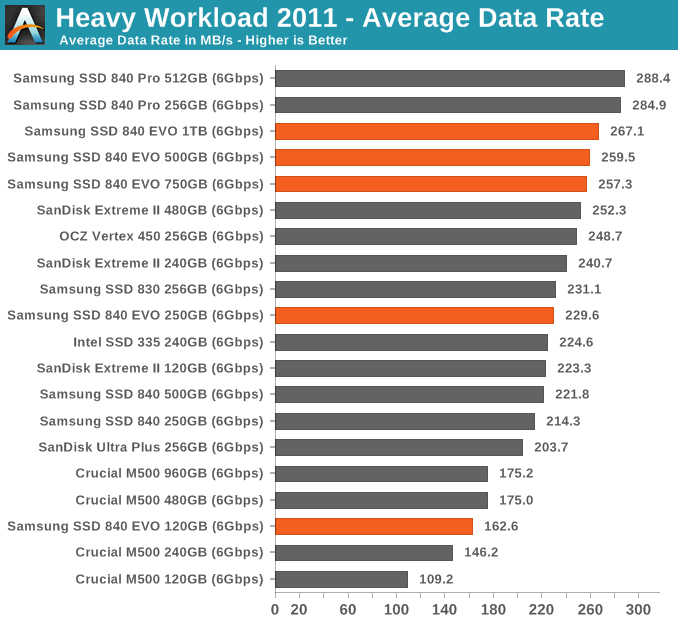
In lighter workloads than our 2013 workload the EVO still does incredibly well.
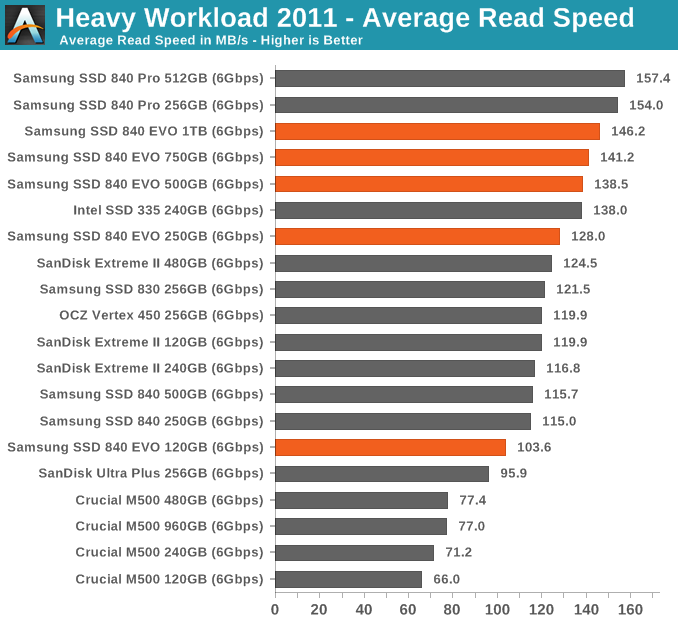
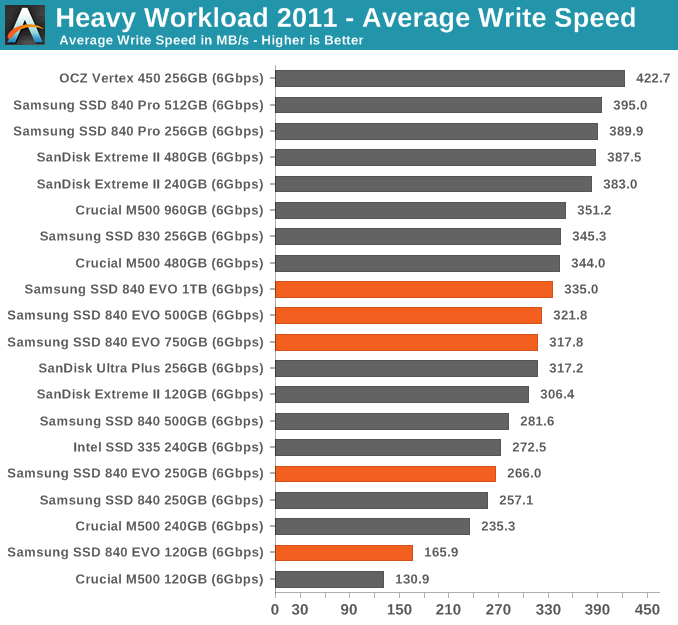
AnandTech Storage Bench 2011 - Light Workload
Our new light workload actually has more write operations than read operations. The split is as follows: 372,630 reads and 459,709 writes. The relatively close read/write ratio does better mimic a typical light workload (although even lighter workloads would be far more read centric).
The I/O breakdown is similar to the heavy workload at small IOs, however you'll notice that there are far fewer large IO transfers:
| AnandTech Storage Bench 2011 - Light Workload IO Breakdown | ||||
| IO Size | % of Total | |||
| 4KB | 27% | |||
| 16KB | 8% | |||
| 32KB | 6% | |||
| 64KB | 5% | |||
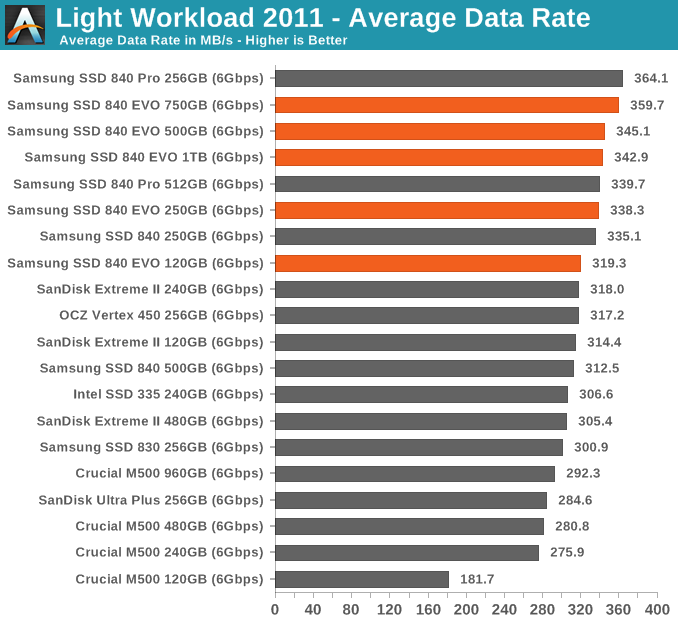
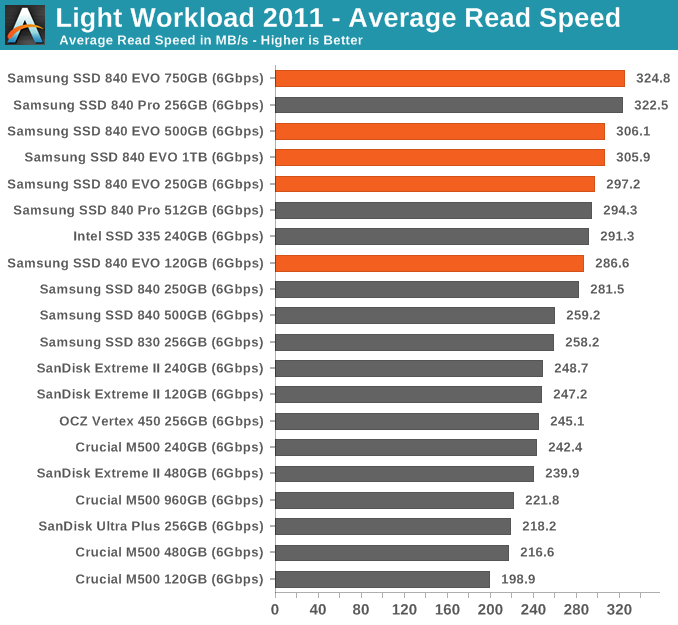
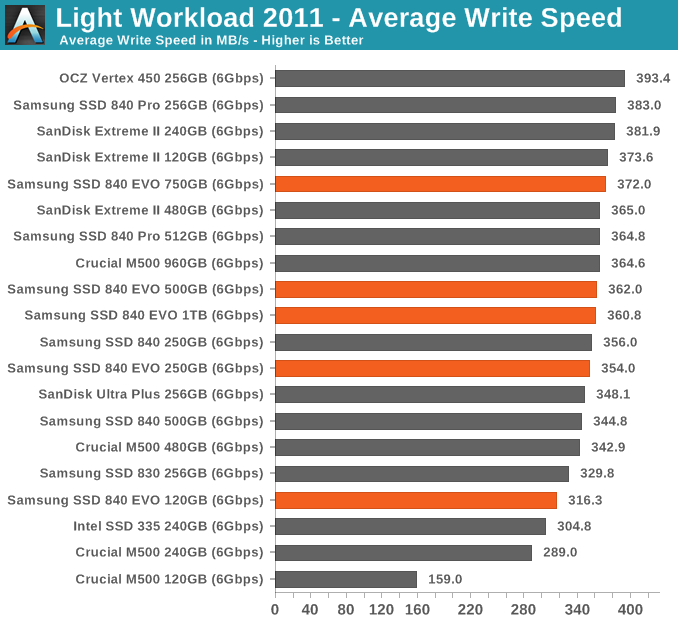










137 Comments
View All Comments
spazoid - Thursday, July 25, 2013 - link
It's free. Free is better.jhh - Thursday, July 25, 2013 - link
Are there any latency measurements in milliseconds as opposed to IOPS? With IOPS, the drive may be queuing rquests, making it difficult to translate IOPS to milliseconds per request.Kibbles - Thursday, July 25, 2013 - link
If I write 1gb/day on average to my SSD, since media files go on my home server, this drive would last me 395 years LOL!sheh - Thursday, July 25, 2013 - link
Anand, would you consider writing an article on the other aspect of endurance: data retention time? With TLC entering the fray it's starting to get even more worrying.It'd be interesting to know how retention time changes throughout a drive's life, trends in the last few years, differences between manufacturers, the effect of the JEDEC standard, whether there's any idle-time refreshing for old written cells, etc.
And an idea: I'd like to see drives where you can configure whether to use the drive as SLC/MLC/TLC. Switch to SLC for reliability/performance, TLC for capacity.
MrSpadge - Saturday, July 27, 2013 - link
"And an idea: I'd like to see drives where you can configure whether to use the drive as SLC/MLC/TLC. Switch to SLC for reliability/performance, TLC for capacity."Or a drive which switches blocks from TLC operation to MLC as it runs out of writes cycles. And finally to SLC.. at which point in time it should last pretty much infinitely.
mgl888 - Thursday, July 25, 2013 - link
Great article.Does RAPID require that you install a separate driver or does it just work automatically out of the box? What's the support like for Linux?
bobbozzo - Friday, July 26, 2013 - link
It's a driver, for Windows.TheinsanegamerN - Saturday, July 27, 2013 - link
and i dont think that rapid has a reason to be on linux. linux is already much better with ssd writes than windows.chizow - Thursday, July 25, 2013 - link
Minor spelling correction: http://www.anandtech.com/show/7173/samsung-ssd-840..."counterfit" should be "counterfeit"
chizow - Thursday, July 25, 2013 - link
Nice review Anand, I'm really glad to see almost all the top SSDs from numerous makers (Samsung, Crucial, SanDisk, Intel) are creeping up and exceeding SATA2 specs across the board and nearly saturating SATA3 specs.It really is amazing though how Samsung seems to be dominating the SSD landscape. I know this review is a bit skewed though since you presumably tried to include almost all the Samsung capacity offerings (for comparison sake), but the impact of the 840, 840 Pro and now the 840 EVO on the SSD market are undeniable. They really have no weaknesses, other than perhaps the Seq. Write Speeds on the 840/EVO.
I guess this is why there's so many deals currently on the 840, I bought the 250GB version earlier this month and don't really regret it given the price I got it for, but the EVO is certainly a step up in nearly every aspect.